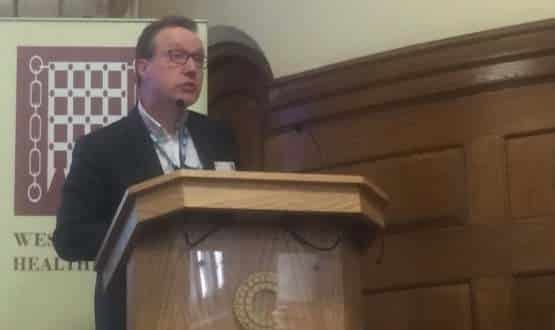NHS England chief information officer Will Smart ‘set to move on’
- 21 June 2019

Will Smart, chief information officer (CIO) for health and care in England, looks set to move on after three years in the role, Digital Health News understands.
Sources have told Digital Health News that Smart is expected to shortly announce he is leaving his role as part of the wholesale shake-up of national NHS IT leadership, resulting from the merger of NHS England and NHS Improvement and creation of NHSX, the new agency responsible for digital.
His departure would be the latest in a string of high-profile national IT leaders from NHS England leaving the NHS.
Matthew Swindells, Smart’s former boss and head of IT at NHSE, departed for Accenture in May, while former chief digital officer Juliet Bauer left to join online GP start-up Livi in April.
Inderjit Singh, who reported to Smart, and led on the Local Health and Care Record Exemplar (LHCRE) programme and architecture and cyber security, announced he was leaving the NHS to join PA Consulting, last week.
If Smart’s departure is confirmed, and sources suggest its now just a discussion about terms, only chief clinical information officer (CCIO), Simon Eccles, would remain of the previous IT leadership team at NHSE.
One source told Digital Health News, “Will always said he’d do three years, which is up in August, and with Matthew [Swindells] having now gone it does seem the logical time for him to go.”
Matthew Gould, chief executive of NHSX is currently on a tour of the NHS, ahead of taking up the official position on 1 July.
Gould is also beginning a recruitment drive for a new Chief Technology Officer.
Prior to becoming the national NHS CIO, Smart was CIO at the Royal Free London NHS Foundation Trust for six years.
As NHS CIO, Smart has been most closely associated with the Global Digital Exemplar programme (including the Royal Free) and the LHCRE programme, both high-profile policies championed by Matthew Swindells.
Smart was chair of judging panel for the Digital Health Awards 2019 earlier this month. He is due to speak at the Digital Health Summer Schools on 19 July.
NHS England has been repeatedly approached for comment and declined to respond.





6 Comments
To be able to lead, the people in the top posts needs to have an understanding of NHS IT either from having been there and done it, or from spending time to understand it properly. We now seem to have daily news releases about how the private sector is expected to innovate; curtailing of funding for current initiatives and senior NHS IT staff with significant experience leaving for the private sector. All the enthusiasm that has been regenerated after the collapse after NPfIT seems to be dissipating. The new NHS IT leaders are not really demonstrating much stability for current NHS IT staff. The implicit message to NHS IT staff-? Leave for the private sector and we will support you and keep your coffers filled…
I agree Mary. Instead we just throw more clinical systems at an antiquated infrastructure, which just makes things worse! There is no optimism here I’m afraid.
The perceptions (mis-perceptions?) of the centre is a critical issue. In CfH days they didn’t see the NHS front line as their customer. Instead they conceptualised patients as the customer, because this provided a moral case for inflicting changes that services might not welcome. It didn’t work.
Now we have NHSX taking a similar line but wrapped up in the argot-du-jour of agile. The problem is the same. If the centre could only restrain its ambition to helping NHS staff to do their jobs more easily, they might have more time for their patients and everyone might be happier.
That is not what stellar civil service careers are made of….
There appears to be a pattern doesn’t there ? a move towards the private sector … what is causing it ? Maybe frustration ? I can sympathize, people like to get stuff done don’t they ? and not just talk about IT.
I think the most interesting thing will be to see whether anyone is recruited who actually understands the way the front-line in the NHS work: there has always been a disconnect between the perceptions of the centre and the needs of Health Care Professionals (all disciplines), other staff, and others needing to access data for other administrative & financial secondary uses.
And then there is “interoperability” and “integrated care records” with apparently little or no understanding of the complexity of the problems some of us have been discussing since 1990 – or earlier…
There are some basic steps which wouldn’t merit banner headlines (& so will probably be overlooked): reliable infrastructure: great increase in bandwidth; address the problems of logging on & changing views or patients without having to use numerous passwords & clicks; updating hardware (does anyone still have Windows XP?) & increasing speed of painfully slow terminals among others.
Risk assessments for change, adequate preparation & good *& ongoing* training would also help – but without full understanding of the *Processes* in each setting, I suspect that the situation won’t be helped by this ongoing rearrangement of the deck-chairs at the centre.
Please show me some grounds for optimism!
Oh Mary, “plus ça change, plus c’est la même chose” as they say.
You have got to develop leaders at all levels, encourage and support them to be innovative and brave, provide them with inspirational national people, policies and strategies. CfH did so much harm, and maybe still is. Clear the decks at the top, push money and decision making down the line, give national direction and standards then leave it to local management and the free market.
Comments are closed.